Free Community of Pasargada
This article needs to be updated. |
This article refers to a micronation or element of micronationalism which is defunct and no longer exists. You can help make the article reflect that or ask on the talk page for further information. |
This article contains too many red links, and may be going through a major copy edit. You can help by clicking on red links and creating articles or by removing unnecessary red links. |
Free Community of Pasargada Comunidade Livre de Pasárgada (Portuguese) | |
|---|---|
|
Flag | |
| Motto: Carpe Diem | |
| Anthem: Vou-me Embora pra Pasárgada | |
| File:Non-territorial | |
| Official languages | Portuguese and Spanish (official), but also English, French, Italian and Esperanto |
| Demonym(s) | Pasargadan |
| Government | Parliamentary Republic |
| André Cyranka | |
| Establishment | April 7, 2001 |
| Population | |
• Census | 90 (2009) |
| Currency | Pasargadan Lire |
Website http://www.pasargada.net | |
The Free Community of Pasargada, or simply Pasargada, was a lusophone micronation founded in April 7, 2001. It was considered one of the most relevant micronations of Lusophone Sector ever, with a large population, well-organized structure and tenacious activity continuously since foundation.
Within micronationalism, Pasargada was considered to be nationhood-style project, that is to say, the project seeks gradual construction of a small-scale society, a real exercise of social and cultural participation with a smaller number of citizens (by August 15, 2009, Pasargada counts 76 active citizens), sharing common ideals, values and histories. Indeed, some sources classify Pasargada in the "non-territorial nomadic subcultures" sub-group, likewise Formori Community.
From 2001 to 2009, Pasargada has been giving a solid and known contribution to micronationalism and micropatriology, strikingly through Pasargadan Turn. Among lusophones, by instance, it has created the alternative movement of micronational realism. Actually, all lusophone micronationry could be explained by two vectors: simulationism of Réunion and Porto Claro, and Pasargadan realism.
 Introduction
Introduction

2001-2009
Pasargada pursues nationhood, which means citizens work together in order to establish a real nation. It has media, diplomatic corps, real symbols, political parties, ideologies, physical meetings, art galleries, university, flags, provinces (the Cantons) etc.
Two inherent and emblematic aspects of Pasargada was the administrative Cantons and political Houses. Both are part of an original and decentralized cultural and political system that makes Pasargada unique in micronationalism. Presently, there was five autonomous Cantons: Efaté, Icária, Cenit, Sloborskaia and Sparta; and three active Houses: Pasargadan Heart, Federalist Alliance and Social Democracy.
Pasargada's population was mostly based in Brazil and it could be considered part of Brazilian micronations and Lusophone sector. However, by 2009, the Community also counts with citizens from Peru, Portugal, Cabo Verde, Argentina and Belgium.
Pasargada also was the land of famous lusophone newspapers, such as the People's Tribune, Impressions, The Socioculturalist, Pasargadan Pulpit and Pravda.
The nation's founding fathers were Bruno Cava, Igor Ravasco, José Luiz Borrás, Leonardo Carrion, Luciana Andrade, Rafael Figueira, Sérgio Schüller and Vítor de Bourg. That time, all eight were experienced micronationalists from Holy Empire of Réunion. Réunion influence was strong in the beginning, and until today, the nation of Claudio de Castro remains firmly the main ally of the Community.
 Commonwealth
Commonwealth
In August, 18th, 2009, Pasargada disclosed the Pasargadan Commonwealth, a heavy-weight initiative in order to regroup efforts and micronationalists in Lusophone Sector. The in-duty Chancellor André Cyranka announced the union of several historically relevant lusophone micronations related to Pasargadan micronationalism.
Associated Nations:
| Pasargada (head-nation) | Domain of Andorra | Cohort-State of Marajo | Canton of Sparta | Canton of Sloborskaia | Protectorate of Avalon |
|---|---|---|---|---|---|
In one way or another, each of those nations has a singular relationship with the history of the Free Community. The new commonwealth immediately matches the Réunian Commonwealth, so far the biggest micronational coalition.
 Diplomacy
Diplomacy
With serious work in diplomacy, the Free Community has established itself a wide reputation in every sector and micronational arena. As a matter of fact, it has established diplomatic relations with more than 200 micronations from every linguistic group and ideological path (statehood, nationhood, simulation, political exercise etc).
In the Pasargadan regime, foreign affairs are handled by the Chancellery, headed by an elected officer or the Chancellor (head of state), for a six-month mandate. The Chancellor leads Pasargadan Diplomatic Corps, which exerts multiple positions in the vice-chancelleries, diplomatic missions and intermicronational organizations.
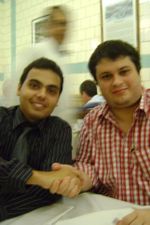
Chancellor André Cyranka (Pasargada) and Emperor Claudio de Castro (Réunion)
It has joined all major leagues in activity since 2001: League of Secessionist States (LoSS, anglophone), League of Micronations (LoM, anglophone, defunct), Micronational Monarchies Organization (OML), represented by monarchical cantons Efaté and Sparta, Esplendid Microunion of Microstatia (SPUM, anglophone, defunct), Virtual Nations Organization (ONV, francophone, defunct), United Virtual Nations Organization (UVNO, germanophone, observer status), Latin American Micronations Organizations (OLAM, lusophone, defunct), United Micronations Organization (OMU, hispanophone), Cimeira (new lusophone organism to be opened officially in 2009) and, finally, the Grand Unified Micronational (GUM, anglophone).
![]() Pasargada in intermicronational organizations:
Pasargada in intermicronational organizations:
| Symbol | Title | Abrev. | Lang. | Situation | Membership | Pas. Emb. |
|---|---|---|---|---|---|---|
| League of Secessionist States | LoSS | Active | Nov 2001 | Bruno Cava | ||
| Micronational Monarchies Organization | OML | Active | Jun 2009 | Rodrigo Mariano | ||
| Grand Unified Micronational[1] | GUM | Active | Aug 2009 - Sep 2011 | Bruno Cava | ||
| United Virtual Nations Organization | UVNO | Active | Aug 2001 | Observer | ||
| League of Micronations | LoM | Extinct | 2001-07 | |||
| Lusophone Commonwealth | CL | Extinct | 2001-04 | |||
| Esplendid Microunion of Microstatia | SPUM | Extinct | 2001-07 | |||
| Latin-American Micronations Organization | OLAM | Extinct | 2001-05 | |||
| Virtual Nations Organization | ONV | Extinct | 2001-06 |
In November 2001, the Free Community, side by side with Republic of Mallorca, innaugurated the famous Lusophone Commonwealth. Later, the Independent Nation of Avalon signed up with the project. The main goal of this innovative Commonwealth was to unite lusophone micronations in a sort of European Union within micronationalism. Pasargada has also participated in the Unity Comity, an initiative among other League of Micronations issues, in order to bring together several micronational projects.
Along its history, some serious micronations have joined Pasargada: the Republic of Sloborskaia, in 2003, separated in 2004 and went dormant in 2006. In 2008, a few former Sloborskaians, together with some Invernesians chose to dismantle Inverness and reestablish the culture of the former Sloborskaia, and enrolled the same Sloborskaia as before as current fourth canton; the Independent Nation of Avalon, as a protectorate, in 2004; and finally the noble Democratic Diarchy of Sparta, in 2009, as the fifth canton.
Currently, major micronational partners of Pasargada are: Réunion (first ally), Eslo, TorHavn, Molossia; Morovia and Scanténoisie-Helvétia (most favoured); Leblandia, Flandrensis, Dreamland, Attera, Flanders, Zarahemla, Apiya, Aerica, Alteria, Patria, Nueva Anahuac, Hansastan, Orange, Komai, Amerada, Jirmania, Bezgranitzburg, Lavalon, Babkha, St.Charlie, Nova Terra, Aerlig, Nautia and Etats du Sud (favoured).
 What Pasargada stands for
What Pasargada stands for
Pasargada doesn't envisage to overpower any current nation-state or its establishment; not in this sense. The nation believes in alternate forms of community for the XXI century, once "Internet has given humanity many new dreams of discoveries and social creation". As a consequence, Pasargada has declared itself oriented to nationhood. True, it is a member of League of Secessionist States. Notwithstanding, the Pasargadan foreign affairs office has been promoting a new name for that august organization: the "League of Sovereign States".
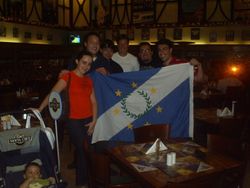
Handmade Belissima (flag)
Some of Pasargadan official policies:
On Territory. Pasargada considers micronational territory to be composed of websites, domains, wikis, e-mail groups and whatever communication interfaces are under the control of a micronational government. PAS respects all others views, though.
On Recognition. Pasargada isn't overly selective, demanding six factors to be accomplished by the nation-candidates: activity, stability, population, territory, claim to sovereignty, and respect to human rights and diplomatic protocols.
On Paplism. Pasargada and Eslo, in 2001, passed Paple Joint Resolution within League of Micronations, to strongly condemn paples and paplism in micronationalism. Obs.: Paplism doesn't refer to the Pope!
On War. Pasargada rejects the concept as entirely unsuitable to micronationalism. Pasargadan policy is to consider every casus belli to be more of national and international crime and, thus, to be denounced to empowered authorities.
On Seriousness and Serious Micronationalism. Pasargada is a lot more than a game, it is a democratic territory where people from many places and beliefs discuss and try solutions for a more human and fair society. Although it is the real thing, with all its problems, there cannot be denied a component of utopia. More than a RPG or a mere hobby, Pasargada is a movement of life and ideas, of citizenship learning. In Pasargada, there are no fictitious characters that someone might play. You are yourself and nothing less. It is all about human real relations, all about people --- not a practical joke.
Pasargada fully endorses the Universal Declaration of Human Rights (UN, 1948), the Interamerican Convention on Human Rights - Costa Rica Pact (OEA, 1969), the Charters of LoSS, GUM, OMU and Cimeira and historical conventions and protocols of Lusophone Commonwealth, in which the nation took part from 2001 to 2005.
 The flag
The flag
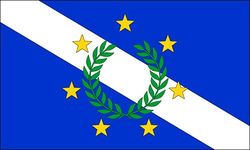
designed by Carlos Fraga in 2001
The outstanding Pasargadan flag, the "Belissima", was elected in 2003, within more than 40 candidates, as the most beautiful flag of lusophone sector. Blue expresses liberty and white equity. The golden stars represent the seven native Cantons: Efaté, Épi, Aniwa, Macunaíma, Santa Maria, Espírito Santu and Inverness.
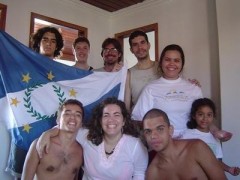
Belissima in fabric: 1 x 1.2m
In particular, the laurels symbolize known Pasargadan intelligentsia, as many research institutes have made fame in the Community, such as FUPEP (Political Studies), INPAM (Micropatriology) and SHMB (Historical Society).
The actual Belissima, in fabric, was manufactured in July 2001, and is solemnly carried in all traditional Annual Pasargadan Meetings and other micronational occasions. Many little flags were also produced for personal usage.
Although there aren't seven cantons anymore (today Pasargada has five), the nation preferred to maintain traditional design no matter how many cantons exist at the time.
Flag's Day is December 15.
 Holidays
Holidays
| Date | Name | Remarks |
|---|---|---|
| 1 January | New Year's Day | World peace confraternization |
| 19 January | Sloborskaian Unification | Celebrates merging of Sloborskaia as Canton in 2004 |
| 24 March | Sparta's Day | Celebrates incorporation of Sparta, in 2009 |
| 7 April | National Day | Celebrates Pasargada's Foundation in 2001 |
| 19 April | Manuel Bandeira's Day | Celebrates birth of Pasargadan patron |
| 1 May | May Day | International Workers' Day |
| 8 June | Constitution Day | Promulgation in 2001 |
| 11 August | Virtualism Extirpation Day | Beginning of Pasargadan Turn, 2001 |
| 5 November | Rui Barbosa Day | Birth of 2nd Patron |
| 27 November | Lusophone Integration Day | Lusophone Commonwealth in 2001 |
| 15 December | Flag's Day | Celebrates national symbols |
 Government and political data
Government and political data
Official Name: Free Community of Pasargada (Comunidade Livre de Pasárgada)
Trigraph: PAS
Common Name: Pasargada
Statute: Written, Parliamentary Democracy
Head of State: His Excellency, Chancellor André Cyranka (acyranka@uol.com.br), since May 2009
Chief of Government: His Excellency, Prime-Minister José Luiz Borrás (Pasargadan Heart House), since June 2009
Highest Court of Law: Council of Togates, with two magistrates: Leonardo Fernandes and Bruno Lamenha
Legislative: Parliament, with ten elected Speakers, two from each Canton, for a six-month mandate. Currently, the Pasargadan Heart house has a comfortable full majority. First-Speaker (highest Pasargadan office) is His Excellency, José Paulo Siqueira (Pasargadan Heart House)
Justice System: Civil (Roman) law, with common law as a subsidiary source
Administrative Division: Five Cantons with reasonable autonomy: Principality of Efaté, Anarchy of Icária, United Margraviates of Cenit (hispanophone minority), Diarchy of Sparta and Socialist Republic of Sloborskaia
Armed Forces: None. Pasargada has a very busy Intelligence Agency, the ARMADA
Constitution: June 2001, presently with 16 amendments
Political parties: called Houses. Three in activity: Pasargadan Heart, Social Democracy and Federalist Alliance. Famous houses in the past: Pasargadan World, No Limits, People's United, Free Pasargada and Democrats
Who is who
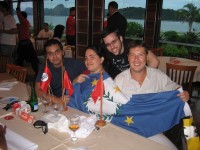
reunián event (May 2009)
Premier José Luiz Borrás (also founder, 2001–02, s. 2009)
Prime-Speaker José Paulo Siqueira (2003–05, s. 2008)
Chancellor André Cyranka (2004–05, s. 2008)
Prime-Togate Leonardo Fernandes (s. 2005)
Deputy Prime-Minister Silvia Soares (s. 2009)

January 2002
Minister of State Bruno Crasnek (s. 2009, also head of Marajoaran Dinasty)
Minister of Under-Structure and Second Speaker Daniel Bojczuk (s. 2009)
Prince of Efaté and Vice-Chancellor for Francophones Vítor de Bourg (also founder, s. 2008)
Togate Bruno Lamenha (2005, s. 2008)
King of Sparta Rodrigo Mariano (s. 2009)
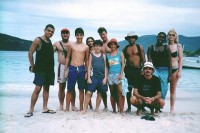
February 2003
President of Sloborskaia and Leader of Opposition Renan Halphen (s. 2006)
Micropatriologist and Dean of UniCM McMillan Hunt (s. 2008; publisher of the Angry Bull)
Micropatriologist Carlos Goes (s. 2008; publisher of the Socioculturalist)
Attorney-General Henrique Rabelo (2004–06, s. 2009)
Queen of Icária Anarchy Danielle Pessoa (s. 2003)
Speaker Andresa Cortes (s. 2002)
Paladin of Cenit Anderson Paiva (s. 2006)
Minister of Defense João Azevedo (s. 2009)
Minister of Economy Yuri Ghenov (s. 2001)
Minister of Communications Michelle Fransan (s. 2009)
Government Speaker Kehsia Lorhana (s. 2009)
Minister of Education and Culture Rafael Cruz (s. 2007)
Minister of Justice and micropatriologist Filipe Sales (2002–05, s. 2008)
Former Chancellor and Master-Diplomat Igor Ravasco (also founder, s. 2001)
Minister of Activity Juliana Benedetti (2002–05, s. 2008)
Journalist and Vice-Chancellor for Anglophones Bruno Cava (also founder, 2001–05, s. 2008; publisher of the People's Tribune)
Speaker Henrique Diogenes (s. 2009)
Journalist and Seneschal Fábio Racoski (s. 2005; publisher of satirical DOC)
Founder of Cenit Mauricio Villacrez (s. 2003)
Minister os Sports Thiago Ulianov (s. 2008)
Journalist Leonardo Gomes (s. 2009; publisher of AGESNO)
Speaker and Former Prime-Togate Roger Moko (s. 2004)
Businessman Elton Sanders (s. 2009; owner of the IPE)
Speaker Ygor Lazaro (2004, 05, 06, s. 2009)
Former Prime-Togate Peter Selke (s. 2002)
Pasargadist Guilherme Pagel (2001–05, s. 2008)
Webdesigner Thiago Arantes (s. 2003)
References
- ↑ Pasagarda was expelled from the GUM in September 2011 for inactivity.
External links
- Website (down)
- WikiPas (down)
- Mail group
- Ning community
- Pasargadan Library
- Orkut
- EcoTrades Bank
- Private Institute of Statistics


